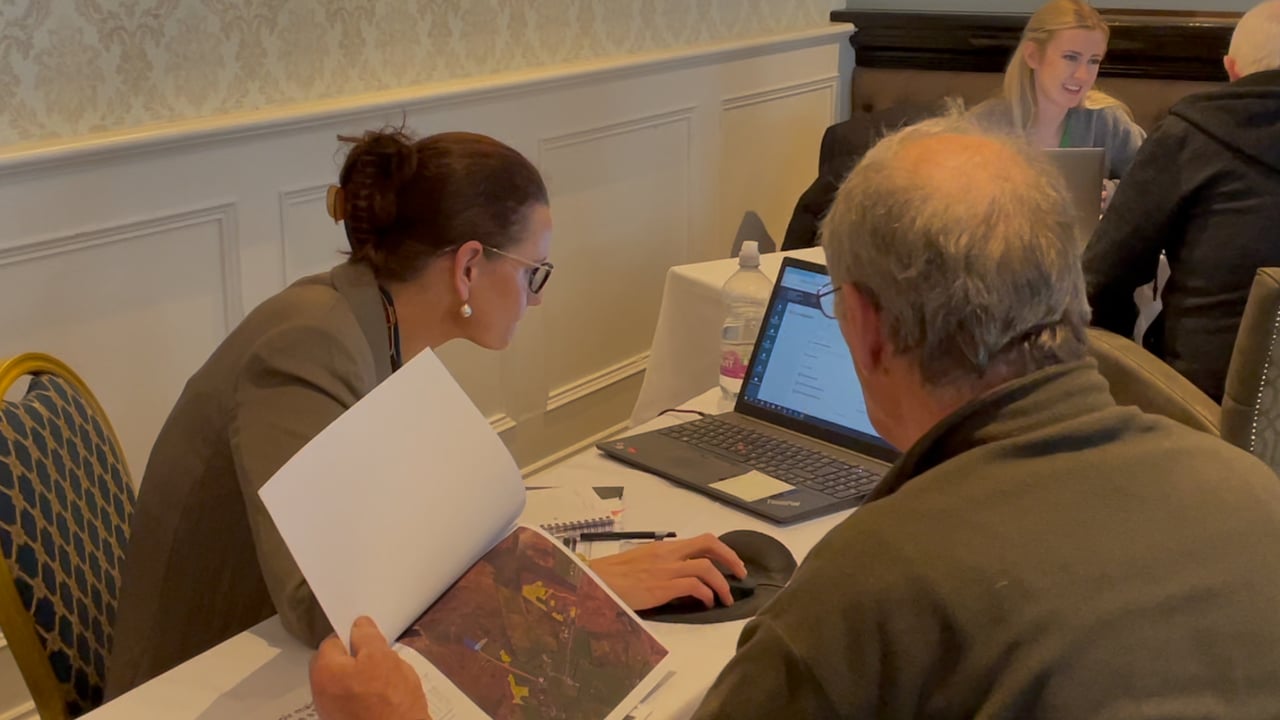Watch: Strong demand for BISS farmer clinic in Kerry
The Department of Agriculture, Food and the Marine (DAFM) is currently running a series of in-person clinics to help farmers in making online applications for Basic Income Support for Sustainability (BISS) and other area-based schemes.
In 2024, almost 1,400 farmers attended the in-person clinics across the country and indications are that demand is strong again this year.
There was a steady stream of farmers when the department staff arrived in Co. Kerry yesterday morning (Wednesday, April 16).
Edel Carty, assistant principal officer in the direct payment unit of DAFM, told Agriland that the clinics are "an additional support to the good advisory system we have out there".
"We a lot of really good advisors, but there are certain farmers who don't have access to an advisor or don't have the ability themselves - computer literacy - to submit the application themselves.
"We're here just to help them. We talk them through the application, all the applications because it's not just your BISS," she said.
The majority of the farmers who turn up at the DAFM clinics are classified as "no change applications".
However, due to additional schemes under the new Common Agricultural Policy (CAP) many farmers will want to put certain parcels into these measures.
"Every farmer knows their land really really well and if you take out a paper map they can point out everything on it, but they do struggle with the IT side, so that's part of why we're here today," Carty said.
She added that DAFM staff are getting "a lot of questions" from farmers in relation to the Good Agricultural and Environmental Condition 2 (GAEC 2), which deals with protecting peatlands and wetlands and will be applicable in 2025.
"Farmers can actually look when they're doing their application to look at the different layers on the Land Parcel Identification System (LPIS).
"We showing them ourselves how to look and identify the peatland that they may have on their farm or their holding," she said.
Carty added that the department will also be writing to all farmers that are affected by GAEC 2 "in the coming weeks".
The department is running a total of 16 BISS clinics for farmers at locations across the country this year.
"I would encourage every farmer, even if you've your application submitted already and you've any questions in relation to it, to pop in and see us. We're there to answer your questions," Carty said.
The remaining clinics, all of which run from 10:00a.m – 4.30p.m, take place on the following dates:
- Thursday, April 17: Raheen, Co. Limerick – DAFM offices;
- Tuesday, April 22: Trim, Co. Meath – Knightsbrook Hotel;
- Wednesday, April 23: Donegal Town – The Central Hotel;
- Thursday, April 24: Drumshanbo, Co. Leitrim – DAFM offices;
- Wednesday, April 30: Carrickmacross, Co. Monaghan – Shirley Arms Hotel;
- Thursday, May 1: Cavan – DAFM offices;
- Tuesday, May 6:Clonmel, Co. Tipperary – Minella Hotel;
- Wednesday, May 7: Mitchelstown, Co. Cork – Firgrove Hotel;
- Thursday, May 8: Clonakilty, Co. Cork – DAFM offices.
DAFM said that it is advisable for farmers planning to attend the clinics to bring details of their Agfood portal login, where available, as well as details of herd number, and their PPSN to verify their identity.
Meanwhile, the department has confirmed to Agriland that as of Tuesday (April 15), 51,373 applications have been received for BISS and other area based schemes.
DAFM previously confirmed that since the scheme opened on February 10 and April 6, it had received 36,748 online applications.
This means that some 14,600 applications were submitted in the nine days up to April 15.
The closing date for BISS applications in 2025 is Thursday, May 15.
This application process also includes the Complementary Redistributive Income Support for Sustainability (CRISS), the Eco-Scheme actions, and the other related schemes.
These include BISS, the Eco-Scheme, the Complementary Income Support for Young Farmers (CISYF), the Protein Aid Scheme, the National Reserve, and transferring of entitlements.
Last year, 124,274 BISS and other area-based scheme applications were submitted to the department from across the country by the deadline.





